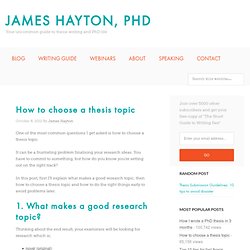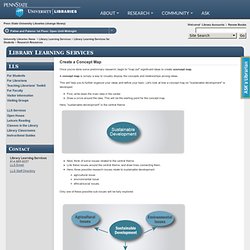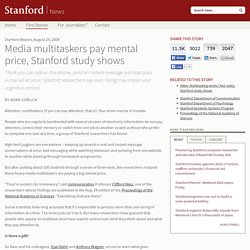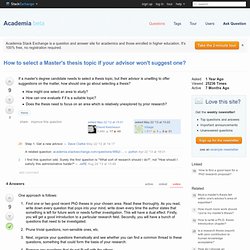

Organize your interests naturally. Share all of this! Add anything from anywhere. Explore your community of interests. Idea Generator. Narrow Your Topic. How to choose a thesis topic. One of the most common questions I get asked is how to choose a thesis topic.

It can be a frustrating problem finalising your research ideas. You have to commit to something, but how do you know you’re setting out on the right track? In this post, first I’ll explain what makes a good research topic, then how to choose a thesis topic and how to do the right things early to avoid problems later. Thinking about the end result, your examiners will be looking for research which is; novel (original)set in the context of the existing research in the field, andcompetently executed When choosing a thesis topic, it makes sense to use these criteria to help you.
Novelty It’s incredibly hard to come up with a completely new idea. There are three approaches to novelty. The second approach is to pick a specific subject you want to study, and identify a question or problem that hasn’t been addressed before in that niche. The third is to apply a new methodology. Context This is because Competence 1. 2. 3. Create a Concept Map. Once you've done some preliminary research, begin to "map out" significant ideas to create aconcept map.

A concept map is simply a way to visually display the concepts and relationships among ideas. This will help you to further organize your ideas and define your topic. Let's look at how a concept map on "sustainable development" is developed. First, write down the main idea in the center. Draw a circle around the idea. Here, "sustainable development" is the central theme. Next, think of some issues related to the central theme. Only one of these possible sub-issues will be fully explored. For each issue, think of sub-concepts that relate to it and connect them to the appropriate issue.
Here, each of the three issues have sub-ideas for possible research exploration. Continue to brainstorm possible ideas. Like this sample, your concept map will grow. Professional PowerPoint Templates for Download. Study: Media multitaskers pay mental price. Stanford Report, August 24, 2009 Think you can talk on the phone, send an instant message and read your e-mail all at once?

Stanford researchers say even trying may impair your cognitive control. By Adam Gorlick Attention, multitaskers (if you can pay attention, that is): Your brain may be in trouble. People who are regularly bombarded with several streams of electronic information do not pay attention, control their memory or switch from one job to another as well as those who prefer to complete one task at a time, a group of Stanford researchers has found. High-tech jugglers are everywhere – keeping up several e-mail and instant message conversations at once, text messaging while watching television and jumping from one website to another while plowing through homework assignments. But after putting about 100 students through a series of three tests, the researchers realized those heavy media multitaskers are paying a big mental price. GCC Library's Contemporary Issues Databases (Look for Issues/Topics Lists)
How to select a Master's thesis topic if your advisor won't suggest one? - Academia Stack Exchange. You'll be amazed at how much the choice of Master's thesis will influence your long-term interest in the field, prospects for jobs within and outside of academia.

I'd suggest picking up some mainstream journals or magazines in your field and see what is currently trendy in the field, and what are bread and butter topics. Having a birds eye view of what's going on in the field allows you to be strategic about your topic, with the goal of planning a successful career. Most likely, a successful career is one that will hook into an existing community of researchers in a topic, with a reliable source of funds that pay for conferences, departments, and students to populate them. A strategic topic is one that has the potential to make an impact in the field, and has the potential to cross-over into related disciplines, or even to have practical applications to real people (god forbid). Finally, and most importantly, choose a topic that gets your blood flowing. Info Literacy 2. Selecting a Topic.